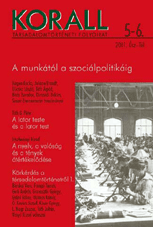Adalékok a munka fogalmának református koncepciójához a 19. századi Magyarországon
Remarks on the Concept of „Work“ among Hungarian Calvinists in the late 19th Century
Author(s): Juliane BrandtSubject(s): History
Published by: KORALL Társadalomtörténeti Egyesület
Keywords: social history; Hungary; 19th century; Calvinists; concept of work; ethic of work; prayer books
Summary/Abstract: The paper investigates the Hungarian Calvinist case as one line within a complex development of ideas related to „work!“ that may often have shown considerable difference to the widely known ideal-typical reconstruction of a protestant work-ethic as given by Max Weber. Looking back first at the origin of the expressions for „work“ and „to work“ in Hungarian and at the occurrence and interpretation of the term in 19th century Hungarian encyclopedias, usage and meaning of the word in Calvinist prayer books are surveyed. In contrast to the encyclopedias that in the line of a general European development regard work a general goal-orineted human activity, the texts demonstrate the ubiquitious survival of an older notion of work as pain and suffering, referring to specific, generally lower valued acrivities. Especially in an older but long-living tradition represented by Szikszay and others, work is a curse, its result depending not on effeort but divine blessing, a this-worldly activity that, if excersised to much, can even be an obstacle to salvation. A last part looks out at contemporary discussions of the Protestant elite on work ethik and alienated work.
Journal: Korall - Társadalomtörténeti folyóirat
- Issue Year: 2001
- Issue No: 5-6
- Page Range: 18-36
- Page Count: 19
- Language: Hungarian

